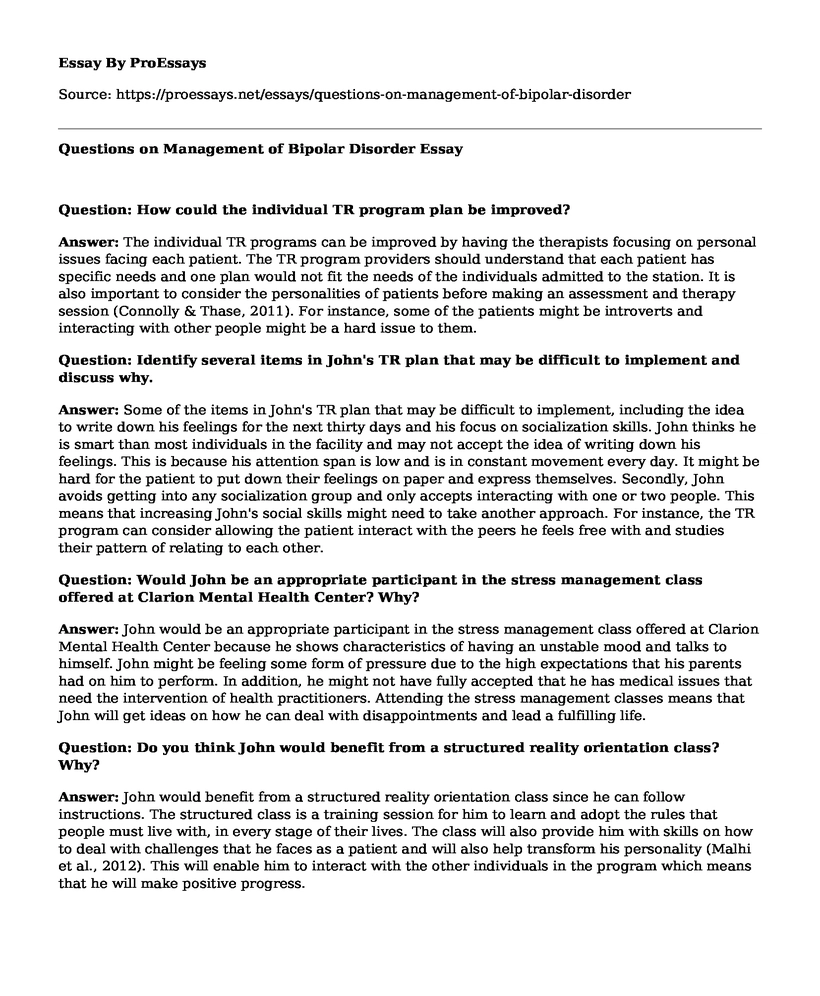Question: How could the individual TR program plan be improved?
Answer: The individual TR programs can be improved by having the therapists focusing on personal issues facing each patient. The TR program providers should understand that each patient has specific needs and one plan would not fit the needs of the individuals admitted to the station. It is also important to consider the personalities of patients before making an assessment and therapy session (Connolly & Thase, 2011). For instance, some of the patients might be introverts and interacting with other people might be a hard issue to them.
Question: Identify several items in John's TR plan that may be difficult to implement and discuss why.
Answer: Some of the items in John's TR plan that may be difficult to implement, including the idea to write down his feelings for the next thirty days and his focus on socialization skills. John thinks he is smart than most individuals in the facility and may not accept the idea of writing down his feelings. This is because his attention span is low and is in constant movement every day. It might be hard for the patient to put down their feelings on paper and express themselves. Secondly, John avoids getting into any socialization group and only accepts interacting with one or two people. This means that increasing John's social skills might need to take another approach. For instance, the TR program can consider allowing the patient interact with the peers he feels free with and studies their pattern of relating to each other.
Question: Would John be an appropriate participant in the stress management class offered at Clarion Mental Health Center? Why?
Answer: John would be an appropriate participant in the stress management class offered at Clarion Mental Health Center because he shows characteristics of having an unstable mood and talks to himself. John might be feeling some form of pressure due to the high expectations that his parents had on him to perform. In addition, he might not have fully accepted that he has medical issues that need the intervention of health practitioners. Attending the stress management classes means that John will get ideas on how he can deal with disappointments and lead a fulfilling life.
Question: Do you think John would benefit from a structured reality orientation class? Why?
Answer: John would benefit from a structured reality orientation class since he can follow instructions. The structured class is a training session for him to learn and adopt the rules that people must live with, in every stage of their lives. The class will also provide him with skills on how to deal with challenges that he faces as a patient and will also help transform his personality (Malhi et al., 2012). This will enable him to interact with the other individuals in the program which means that he will make positive progress.
Question: Based on John's needs select two other activities that he would benefit from, explain your selection.
Answer: Based on John's needs, some of the activities that would benefit him includes identification of the things he likes doing and building solutions around them. For instance, the program should allow John to spend more time in the gym and attend picnics with the specific individuals that he likes. Other activities include playing physical games and listening to calming music (Connolly & Thase, 2011). When John is actively engaged in different activities, his body will get tired and will be able to settle down within a short time. In addition, when the patient listens to music, he will be able to sit still and remain attentive.
Question: If John's symptoms were similar, but his diagnosis was schizophrenia, would the Certified Therapeutic Recreation Specialist intervene differently? How and Why?
Answer: If John's diagnosis were schizophrenia, the CTRS would intervene differently since the medication and therapy sessions would adopt different approaches. A patient with schizophrenia might need to take antipsychotic medication like Clozapine, even though they need the intervention of a healthcare assistant (Licht, 2012). For instance, when a patient has schizophrenia, they need a therapy session where they will accept and commit themselves towards improving their health status. The patient may also need to go through a cognitive-behavioral therapy which aims at reducing the depression and anxiety feelings.
References
Connolly, K. R., & Thase, M. E. (2011). The clinical management of bipolar disorder: a review of evidence-based guidelines. The primary care companion for CNS disorders, 13(4).
Licht, R. W. (2012). Lithium: still a major option in the management of bipolar disorder. CNS neuroscience & therapeutics, 18(3), 219-226.
Malhi, G. S., Bargh, D. M., McIntyre, R., Gitlin, M., Frye, M. A., Bauer, M., & Berk, M. (2012). Balanced efficacy, safety, and tolerability recommendations for the clinical management of bipolar disorder. Bipolar disorders, 14(s2), 1-21.
Cite this page
Questions on Management of Bipolar Disorder. (2022, Mar 29). Retrieved from https://proessays.net/essays/questions-on-management-of-bipolar-disorder
If you are the original author of this essay and no longer wish to have it published on the ProEssays website, please click below to request its removal:
- The Fear of Numbers - Paper Sample on Mathematics Anxiety
- Aggression in Teenagers and Treatment Essay
- Self-Reflection: Motivation Paper Example
- Essay Sample on Mindsets and Learning
- Cyclothymic Disorder: Emotional Ups and Downs of a Rare Mood Disorder - Essay Sample
- Paper Example on Mental Disorders and Psycho-Behavioral Challenges on the Rise in China
- Paper Example on Brain Cells: Age-Related Changes and Mental Health







